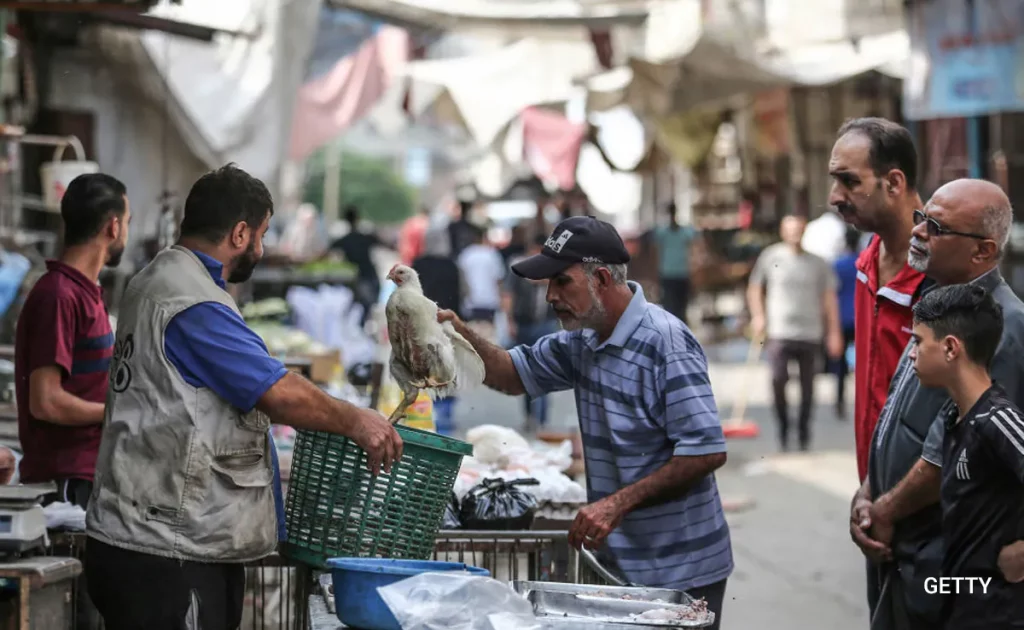War, an unyielding force that has afflicted humanity throughout history, exacts a devastating toll on the nations caught in its grip. Beyond the immediate destruction and loss of life, one of its most debilitating consequences is the profound disruption of agriculture and food production. Conflict disrupts the agricultural systems of nations, rendering them unable to feed their populations. When wars break out, fields remain unproductive, infrastructure crumbles and farmers are displaced, resulting in acute food shortages and hunger.
The Israel-Hamas conflict, which erupted on October 7, 2023, has caused severe food shortages in Gaza, further intensifying the overarching humanitarian crisis. The coordinated and surprise offensive on Israel allegedly started with about 5,000 rockets launched from the Palestinian militant groups in the Hamas-controlled Gaza Strip. This war has significantly disrupted critical supply chains, leaving the people of Gaza in a state of turmoil, uncertainty, and insecurity. Nevertheless, the primary concern in this piece remains the issue of food insecurity. The ongoing conflict has, no doubt, impeded agricultural activities, caused damage to infrastructure, and restricted the movement of both goods and people. Additionally, it has profoundly impacted the distribution of humanitarian aid, making it challenging to assist those in need.
In a recent report by the Cable News Network (CNN), it was highlighted that only a limited number of relief aid trucks have been allowed to enter Gaza from Egypt. Despite these constrained deliveries, relief agencies express their concerns that the current rate of aid distribution falls significantly short of addressing the pressing needs of the 2 million people residing in the Gaza enclave. The situation remains critical as essential humanitarian assistance faces obstacles in reaching those in need. The Biden administration has recommended that Israel postpone a ground invasion of Gaza to facilitate hostage negotiations and to enable more humanitarian aid to reach Palestinians.
The Deputy Head of Emergencies at the World Food Programme (WFP), Brian Lander, has emphasised the critical humanitarian aid shortfall in Gaza. He pointed out that, before the conflict, approximately 465 trucks of aid were required daily to support the population. Currently, he said they are receiving just about 20 trucks a day. This shortage is leaving the people of Gaza in desperate need of essential resources like water, food, and other vital products. The World Health Organisation (WHO) also reported the delivery of medicines and health supplies to three key referral hospitals in southern Gaza. Still, the need remains pressing, particularly in the densely-populated northern part of the Palestinian enclave. Gaza continues to grapple with severe humanitarian challenges as it seeks essential aid to meet the needs of its population.
American business news and television channel, CNBC, formerly Consumer News and Business Channel, has also reported that a third humanitarian aid convoy reached the Gaza Strip, delivering vital provisions, including water, food, and medicine. These humanitarian deliveries, as previously mentioned, began through the Rafah crossing from Egypt. Initial delays were due to logistical challenges related to aid inspections and border bombardments on the Gaza side, temporarily stranding relief supplies in Egypt. It is evident that there is an urgent need for additional aid to alleviate the suffering of those affected by the ongoing conflict. The European Union (EU) Foreign Policy Chief, Josep Borrell, called for accelerated aid deliveries to Gaza and disclosed that the European Union is considering proposing a “humanitarian pause” in Israel’s conflict with Hamas.
Borrell has stressed the need for swifter aid distribution, focusing on vital resources like water and electricity restoration. He expressed concern that the limited humanitarian aid trucks allowed into Gaza from Egypt were insufficient and highlighted the critical necessity for fuel to generate power and provide drinking water. Additionally, Borrell mentioned that EU ministers would deliberate on the calls for a “humanitarian ceasefire” by the United Nations’ Secretary-General, Antonio Guterres. Borrell had advocated for humanitarian pause to facilitate the distribution of humanitarian support, given the significant displacement of Gaza’s population from their homes.
The food shortage in Gaza, exacerbated by the Israel-Hamas war, is not just a symptom of the immediate crisis, but also a broader issue that underscores the urgent necessity for lasting peace and sustainable solutions in the region. As the conflict endures and humanitarian crisis deepens, the global community faces the challenge of providing critical aid while also seeking a path toward a peaceful resolution. The impact of war on agriculture and food security serves as a stark reminder of the human cost of protracted conflicts, underscoring the importance of diplomatic efforts and international cooperation to prevent such crisis in the future.

